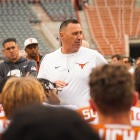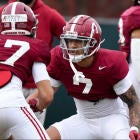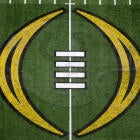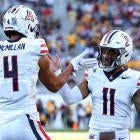In its latest attempt to delay the Ed O’Bannon trial, the NCAA has filed an emergency petition with the 9th U.S. Circuit Court of Appeals.
Lawyers for the NCAA asked the appeals court to vacate U.S. District Judge Claudia Wilken’s order for the trial to start June 9. The NCAA also wants the appeals court to rule that the O’Bannon antitrust trial should not be held before the Sam Keller right of publicity trial involving videogames, a related but now separated case scheduled for trial in March 2015.
The filing late Thursday night marks the fifth attempt by the NCAA in recent weeks to delay and/or redefine the case. A three-judge panel from the 9th Circuit Court of Appeals previously rejected one of the delay attempts without comment.
In this latest petition, first reported by USA Today Sports, the NCAA contends there are overlapping issues between the O’Bannon and Keller cases that would violate the Seventh Amendment if Wilken rules on the O’Bannon case prior to a jury hearing the Keller case. The O’Bannon plaintiffs are seeking an injunction to end the NCAA’s rules prohibiting football and men’s basketball players from being paid for use of their names, images and likenesses.
Two weeks ago, the O’Bannon plaintiffs dropped their individual damages claims against the NCAA before a jury trial. The NCAA cites that change as a reason for the emergency petition.
Wilken previously ruled there are no Seventh Amendment issues and denied the NCAA’s request to sever all evidence and claims related to videogames from the antitrust case. She has stated that if “factual issues are decided at the bench trial are important to the subsequent jury trial, then those issues may be re-tried during the jury trial” unless there’s a final judgment not subject to appeal or an issue that can’t be relitigated.
The NCAA seeks a decision from the appeals court by 8:30 a.m. on June 9, which is when the O’Bannon trial is scheduled to begin in Oakland, Calif.
"The petition filed today with the Court of Appeals makes clear the NCAA's serious concerns about potential violations of the Constitution resulting from the plaintiffs' last-minute maneuvering to obtain a bench trial,” NCAA chief legal officer Donald Remy said. “While the NCAA does not take this step lightly, it could not abandon its right to a jury trial without seeking further review.”
Michael Hausfeld, the lead attorney for the O’Bannon plaintiffs, called the NCAA’s appeal “one last desperate effort to avoid trial.” Hausfeld said the appeals are rarely granted, “but if you’re responsible counsel, you’re concerned about everything.”
“We’re going to be arguing that from the very inception of the consolidation (of the Keller and O’Bannon cases), the court clearly expressed the view that the trial of the antitrust case and the trial of the right of publicity case might be separated,” Hausfeld said.
On the same day one set of NCAA lawyers argued the O’Bannon and Keller cases should be tried together, another NCAA lawyer essentially argued the opposite in a different case related to scholarship values.
The NCAA asked the U.S. Judicial Panel on Multidistrict Litigation not to centralize at least five antitrust class actions brought by college athletes who claim they have been illegally denied more value beyond their scholarship. The Shawne Alston cost-of-attendance plaintiffs are seeking to consolidate several cases, including Jeffrey Kessler’s lawsuit that attempts to essentially make college athletes free agents.
According to a story by Law360, NCAA attorney Jeffrey Mishkin argued that the relatively small number of cases and their subtle differences weighed against merging the suits. There is “certainly a core issue about the rules, but they are approached differently by the plaintiffs,” Mishkin said, according to Law360. Mishkin added that consolidating the cases in Oakland before Wilken would be a “spectacularly inconvenient forum” for the consolidated litigation since most of the plaintiffs and defendants are located outside the Pacific time zone.




















